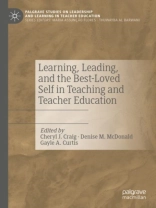This book explores the concept of the ‘best-loved self’ in teaching and teacher education, asserting that the best-loved self is foundational to the development of teacher identity, growth in context, and learning in community. Drawing on the work of Joseph Schwab, who was the first to name the ‘best-loved self, ‘ the editors and their contributors extend this knowledge further through the collaboration of their group of teacher educators, known as the Faculty Academy, who have been involved in examining teacher education for over two decades.
Table des matières
I. Introducing the Book and the Best-Loved Self.- Chapter 1. Introducing the Book.- Chapter 2. Introducing the Best-Loved Self.- II. Identifying the Best-Loved Self.- Chapter 3. Challenging Teaching Experiences Cultivate Profound Professional and Personal Rewards.- Chapter 4. Searching for the Best-Loved Self.- Chapter 5. Teachers’ Best-loved Selves in Changing Contexts.- Chapter 6. The Mathematics Educator Mother: An Emergent Best-Loved Self from Two Separate Identities.- Chapter 7. Kicking and Screaming: Reflections of a Reluctant Educator and Educational Leader.- Chapter 8. Joined at the Hip: Learning the Ropes and the Charge to Pass it On.- Chapter 9. Vignettes of the Best-Loved Self.- Chapter 10: Exploring your Past to Strengthen your Best-Loved Self.- Chapter 11. Discovering the E in STEM.- Chapter 12. Researching, writing and shepherding the Best-Loved Self.- Chapter 13. Unleashing the Best-Loved Self.- Chapter 14. Engaging in Social Media Scholarship as an Act of Sustaining our Best-Loved Black Selves: Black American Womxn Scholars and Emancipatory Knowledge Transfer.- Chapter 15. Finding one’s Best-Loved Self Internationally.- Chapter 16. Creating a Milieu for the Best-Loved Self to Flourish.- III. One’s Best-Loved Self Reflected Back.- Chapter 17. Breaking Down Barriers: Obstacles STEM Students Face When Challenging Misinformed Perceptions about the Teaching Profession.- Chapter 18. She Even Gave Me Her Liver: A Story Given Back.- Chapter 19. Bernardo through Jackie’s Eyes and Jackie through Bernardo’s Eyes.- Chapter 20. Rediscovering the ‘Good’ in Teaching: How Lost Stories of Our Best-Loved Selves Sustain Educators.- Chapter 21. Discovering the Best-loved Self as a Multifaceted Mentor.- IV. Parting Words.- Chapter 22. What We Know About the Best-Loved Self in Review.- Chapter 23. Where To From Here?.- Afterword: The Best-Loved Self Poem.
A propos de l’auteur
Cheryl J. Craig is Professor and the Houston Endowment Endowed Chair of Urban Education at Texas A&M University, USA. She also serves as the Program Lead of Technology and Teacher Education and is the founding director of the Collaborative for Innovation in Teacher Education. Craig is an American Educational Research Association (AERA) Fellow and has received career awards from AERA’s Division B (Curriculum) and Division K (Teacher Education) in addition to the Michael Huberman Award for Contributions to the Understanding of the Lives of Teachers.
Denise M. Mc Donald is Professor, Program Coordinator of Teacher Education, and Sandra Johnson/Barrios Technology Endowed Professor at the University of Houston – Clear Lake, USA. Mc Donald teaches curriculum and instruction courses in undergraduate, master’s, and doctoral programs. Her research interests include teacher education, scholarly identity formation, learner motivation, and reflective, relational, and exemplary pedagogy. She employs qualitative research methods, such as self-study, narrative inquiry, and critical ethnography to explore topics of interest.
Gayle A. Curtis is a Program Manager for the Asian American Studies Center at the University of Houston, USA, and Research Associate for the College of Education and Human Development, Texas A&M University, USA. Her research delves into the lives of teachers, teacher preparation, reflective practice, teacher collaboration, and identity. She employs narrative inquiry, critical ethnography and self-study depending on the inquiry at hand.












